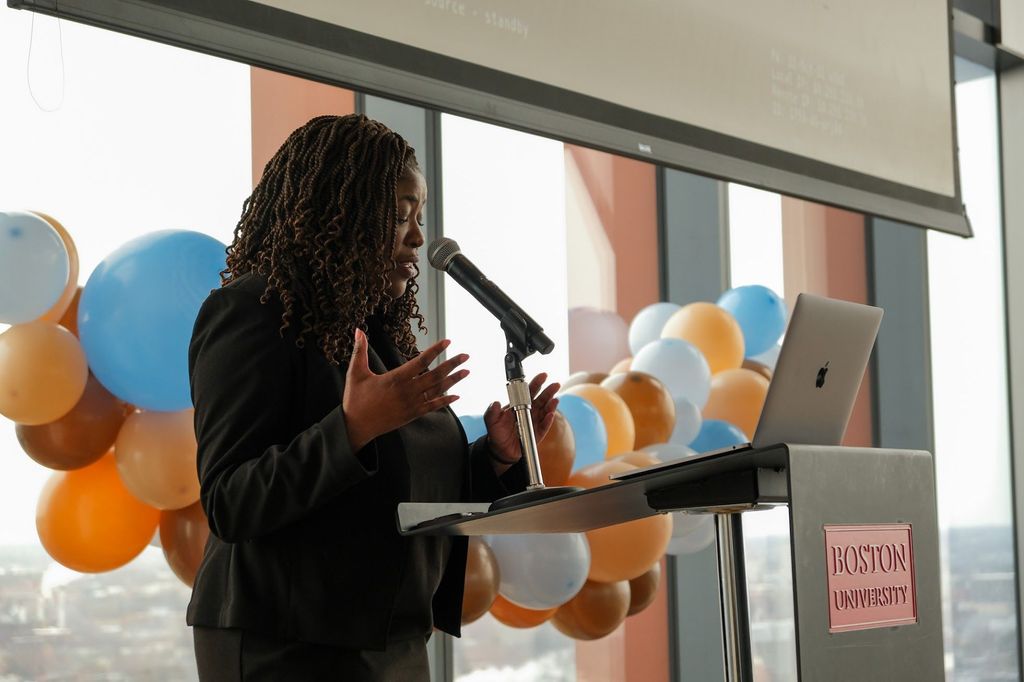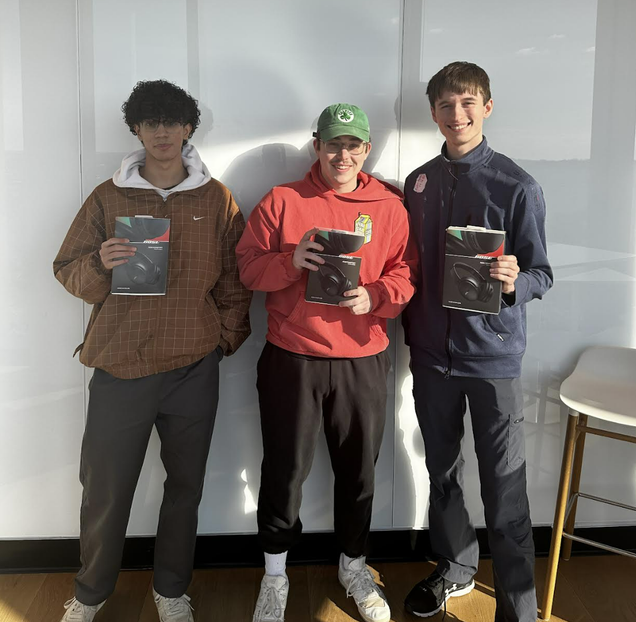Civic Tech Hackathon Demonstrates the Power of Public Interest Technology for Second Year
Students from across the country participated in a two-day hackathon, spearheaded by Tech for Change, to solve society’s most pressing challenges.
From data breaches to nationwide outages, technology is constantly battling against alarming complications. But there’s a new generation of students who believe technology should be used to foster a better and more equal society.
On February 17-18, 2024, BU’s Center for Computing and Data Sciences served as the epicenter of advancing public interest technology at Tech for Change’s Civic Tech Hackathon. The space was abuzz with 150+ students from 19 schools dedicated to solving problems plaguing several sectors within their community. To emphasize the interdisciplinary nature of public interest technology, students from all backgrounds, technical or not, forged together in teams in an attempt to secure over $5000 in prizes.

Outside of the technical diversity, having students from all walks of life participate was vital to the leadership team behind the hackathon. “As a Black woman in STEM, it was particularly meaningful to champion diversity and ensure that our participants reflected a broad spectrum of backgrounds and disciplines,” Marketing Lead Karrington Riley said. “Creating an inclusive environment where everyone felt valued and empowered to contribute was paramount to us. The hackathon itself was a vibrant celebration of diversity and innovation.”
Over the course of two days, students spearheaded innovative technological solutions focused within certain “tracks,” including the following:
- Healthcare/Quality of Life: Leverage technology as a catalyst for positive change towards a sustainable and equitable future in healthcare.
- Racial/Gender Equality: Harness technology to dismantle racial and gender barriers across various domains.
- Election Involvement: Use technology to increase involvement, inclusivity, and overall efficacy in elections
- Climate Change: Wield technology to tackle environmental challenges, foster sustainable practices, and ensure a climate-resilient future for all.

Pictured left to right row 1: Latanya Khissy Beyniouah (Howard University), Tadiwa Zinyongo (Boston University), Raniya Delil (Boston University), Favor Wariboko (Boston University), Justin Stewart (Howard University), Ankur Gyawali (Howard University)
Pictured left to right row 2: Louie Belile (Boston University), Bernadelle Boateng (Boston University), Karrington Riley (Boston University), Isabel Torres (BU Faculty), Khadija Ali (Boston University), Aauyushka Budhathoki (Howard University), Zoey Hall (Howard University)
Not only did students ideate applicable solutions, but they also brought their ideas to life through prototyping. For many, this meant not a moment was to be wasted. “Throughout the overnight sessions, observing students tirelessly working on their projects and experiencing the satisfaction of overcoming challenges, whether it was solving a bug or making a breakthrough, truly encapsulated the spirit of the hackathon,” Project Manager Raniya Delil said.
Going into the second year of this hackathon originally created by students at Boston University and Howard University, participants were offered another opportunity to sharpen their hard skills in workshops centered around mobile app development, HTML/CSS, AI API, Git, and more.

Boston City Council President, Ruthzee Louijeune delivers the hackathon keynote presentation
Outside of skill building, the hackathon also offered an opportunity to network and learn from event sponsors including Bose, Accenture, MassMutual, SharkNinja, InterSystems, Software & Application Innovation Lab, New America, and even keynote speaker, City Council President and City Councilor, Ruthzee Louijeune. “Their interactions went beyond transactions, fostering genuine relationships and opening doors to future collaboration,” Fundraising Chair Tadiwa Zinyongo said. “I’m proud to have played a role in facilitating these connections and contributing to such a meaningful initiative that exemplifies the power of collaboration and collective action.”
The collaboration between BU and Howard University started in 2023 as a result of a successful proposal funded through the Public Interest Technology University Network Challenge Grant managed by New America. Organizers from 13 schools including Columbia University, Stanford, and U Michigan shadowed the BU and HU host organizing teams with the goal of organizing their own regional events in 2024-2025. The national hackathon moves to Howard University next year; the BU-based efforts will continue in 2025 focused on regional participation in collaboration with the Public Interest Technology New England Network. The Boston University chapter of NSBE also serves as the university’s affiliate for the Tech for Change national club network.
At the end of the hackathon, participants, judges, sponsors, and organizers alike can agree that each project demonstrates a deep commitment to a more equitable world. Get acquainted with each prototype here.
2024 Civic Tech Hackathon Winners
SymptoCare — Best Overall Hack

Jaden Leung, Ryan Gilbert, Ethan Levine, Amy Liu
SymptoCare is a platform designed to provide healthcare accessibility and delivery through a disease search tool. This tool is designed to provide users with an easy way to check their symptoms against a database and find the closest matching diseases.
ZKElection — Best Impact

Wes Jorgensen, Saad Naji, Collin Barber
This platform transparently, verifiably, and securely allows people to vote online using the blockchain, and Zero-Knowledge proofs for privacy and verification.
Chug — Most Engaging Pitch

Khalid Jama, Daniel Wijaya, Chung-Yeh Yang, Kevin Brown
Chug is a web application that tracks users’ water intake and rewards BU students with points that they can convert to BU dining and convenience points.
PharmaCutieCal — Best Technical Execution

Roshan Dadlani, Muskan Raisinghani, Tejas Sridhar, Ansul Chaudhary, Abishek Nair
PharmaCutieCal addresses the challenge of varied drug responses by recommending personalized drug impacts based on individual medical histories.
—
The Tech for Change Hackathon team is supported by BU Spark!, an innovation and experiential learning lab for computing and data science projects based at Boston University’s Faculty of Computing & Data Sciences. Spark! provides the infrastructure to support student innovation projects and engagement in applied research or real-world technology projects, while fostering an inclusive, connected community around interdisciplinary computing and data science.